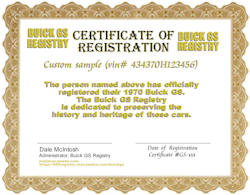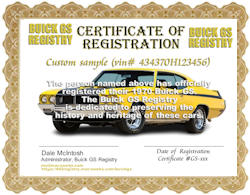Frequently Asked Questions
Q: What does 'GS' mean?
A: The "GS" nametag as applied here refers to the Buick
Skulark-based model. Buick was a bit late coming into the GM A-Body
performance market. While Chevrolet, Oldsmobile, and Ponitac had
their A-Body high performance options in 1964, the Buick Skylark
Gran Sport (GS) didn't appear until the 1965 model year.
When GM lifted the 400 cid engine ban in 1965, Buick upped the ante with their 400 cid engine that technically displaced 401 cid. The GS engine pumped out 325 hp and 445 lb. ft of torque and sold over 15,000 Skylarks with the Gran Sport optin.
The car was renamed the "GS 400" in 1967 and became its own model instead of an option on the Skylark along wiht a new 400 engine that was different from the 'old' 401 cid 'nailhead' design. The 'California GS' was a new model for California dealers. This thin-pillared cupe came with the 340 cid/260 hp engine.
Mid-year 1968 saw the 'official' introduction of the California GS and sometimes referred to as a 1969 model. Designed for California motorists but advertised nationally. New for 1968 was their 350 cide with 280 hp.1969 was the last year for the California GS.
Q: Is my Buick GS real?
A: This can be tricky at best. To some, 'real' means the car
has the correct and original engine it was born with and can be
matched to some form of documentation. To some, it means if the
documentation says it was born with the GS option, it doesn't (relatively) matter
that the engine has been replaced for one reason or another; whether
by a dealer under warranty or an over-avid enthusiast 'back-in-the-day'
due to out of warranty breakage. Consider if the car has a warranty
engine with CE code engine, but has documentation that is original
to the car as noted by the VIN sequence and other information of the
sheet matching the trim tag.
As far as the GS Registry is concerned, correct and valid documentation is the primary objective in the registry, not current engine.








